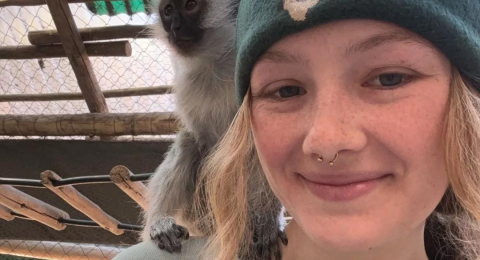The Bachelor of Science degree program in Zoology at UNH delivers a comprehensive understanding of animal biology, behavior and evolution. As a zoology major, you will delve into the study of diverse species, from microscopic organisms to large mammals, learning about their physiology, genetics and ecological roles and gain hands-on experience through laboratory work, field studies and research projects. The program is ideal for those passionate about animals and interested in scientific exploration and an impactful career in biology and conservation.
What is zoology?
Zoology is a field within the biological sciences that is dedicated to the study of animals: their origin and development as well as their habits, behaviors and relationships. It includes both the study of individual animals and their constituent parts down to the molecular level, and the study of animal populations and the relationships of animals to each other, plants, microbes and the nonliving environment. Students enrolled in the B.S. degree program take a series of core biology courses, then can specialize in disciplines such as marine and freshwater biology, cell and developmental biology, ecology, evolution or neurobiology.
Why study zoology at UNH?
Learning zoology at UNH is enhanced by easy access to ocean, lake and mountain habitats. Our programs emphasize hands-on learning and directly engage undergraduate students in research, and our faculty are experts in a wide range of disciplines, including freshwater, estuarine and marine biology, aquaculture, physiology, neurobiology and behavior. Students can conduct research in numerous facilities, including the Anadromous Fish and Aquatic Invertebrate Research Laboratory, the Aquaculture Research Center, the Chase Ocean Engineering Laboratory, Jackson Estuarine Laboratory, the Judd Gregg Marine Research Complex and the Shoals Marine Laboratory.
Potential careers
- Animal care
- Biotechnology
- Consulting
- Conservation biology
- Education
- Fisheries biology
- Pharmaceuticals
- Public relations
- Research
- Wildlife rehabilitation
Curriculum & Requirements
The Bachelor of Science (B.S.) in Zoology builds from the common background of the biology core curriculum to provide ample time for third- and fourth-year students to concentrate in specialized disciplines such as marine and freshwater biology, behavior, cell and developmental biology, ecology, evolution, fisheries, physiology, and neurobiology while giving students the foundation from which they can specialize in the area of zoology. Undergraduate students are encouraged to conduct field or lab-based research which helps determine advanced education disciplines for graduate studies. Many students ultimately work in the government, environmental agencies, education as well as agricultural, pharmaceutical, and biotechnology industries, where they conduct advanced research and/or teaching. Zoology majors had the second highest income and lowest unemployment rate according to data from the 2016 U.S. Census Bureau’s American Community Survey.
New England Regional Student Program
The bachelor's degree in zoology is one of the specialized curricula recognized by the New England Board of Higher Education and participates in the New England Regional Student Program. Please refer to the Tuition Break Online Database for a list of eligible New England States.
Degree Requirements
All Major, Option and Elective Requirements as indicated.
*Major GPA requirements as indicated.
Major Requirements
Minimum grade of D‐ or better is required in CHEM 403, CHEM 404, CHEM 545, CHEM 546, PHYS 401, PHYS 402, and MATH 424B (if taken); minimum grade of C‐ or better is required in all other courses.
ZOOL 600, BIOL 695, ZOOL 795, or ZOOL 799H may substitute for one elective with academic advisor approval, if taken for a minimum of four credits. The four credits may be spread over multiple semesters if they are consecutive and with the same faculty mentor.
| Code | Title | Credits |
|---|---|---|
| Core Curriculum Courses | ||
| BIOL 411 | Introductory Biology: Molecular and Cellular | 4 |
| BIOL 412 | Introductory Biology: Evolution, Biodiversity and Ecology | 4 |
| BIOL 528 | Applied Biostatistics I | 4 |
| BIOL 541W | Ecology | 4 |
| BMCB 658A | General Biochemistry | 3 |
| CHEM 403 | General Chemistry I | 4 |
| CHEM 404 | General Chemistry II | 4 |
| CHEM 545 & CHEM 546 | Organic Chemistry and Organic Chemistry Laboratory | 5 |
| BIOL 633 | Data Analysis for Life Science | 4 |
| or BIOL 428 | Quantitative Biosciences | |
| or BIOL 711 | Experimental Design & Analysis | |
| or MATH 424B | Calculus for Life Sciences | |
| ANSC 612 | Genetics of Animals | 0 |
| or GEN 604 | Principles of Genetics | |
| PHYS 401 | Introduction to Physics I | 4 |
| PHYS 402 | Introduction to Physics II | 4 |
| ZOOL 400 | Professional Perspectives in Zoology | 1 |
| ZOOL 518 | Comparative Morphology and Biology of Vertebrates | 4 |
| ZOOL 625 & ZOOL 626W | Principles of Animal Physiology and Animal Physiology Laboratory | 5 |
| ZOOL 690 | Evolution | 4 |
| Capstone | ||
| BIOL 780 | Capstone Companion Course | 1 |
| Zoology Electives | ||
| Animal Survey Courses | 4-5 | |
Select one course from the following: | ||
ZOOL 542 | Ornithology | |
ZOOL 555 | Introduction to Entomology | |
ZOOL 566 | Herpetology | |
MEFB 510 | Field Ornithology | |
MEFB 628 | Marine Invertebrate Evolution and Ecology | |
ZOOL 710 | Sharks and Bony Fishes | |
NR 712 | Mammalogy | |
| Electives | ||
| Select three courses from the following: 1 | ||
| ANTH 660 | Human Osteology | 4 |
| BIOL 695 | Biology Teaching Practices | 1-4 |
| BIOL 706 | Data Science with R for the Life Sciences | 4 |
| BIOL 720 | Plant-Animal Interactions (C) | 4 |
| BMS 718 | Mammalian Physiology | 4 |
| BMS 503/504 | General Microbiology | 3 |
| MEFB 503 | Introduction to Marine Biology | 4 |
| MEFB 510 | Field Ornithology | 4 |
| MEFB 628 | Marine Invertebrate Evolution and Ecology | 5 |
| MEFB 675 | Marine Mammal Biology and Conservation | 3 |
| MEFB 717 | Lake Ecology | 4 |
| MEFB 755 | Biological Oceanography | 3 |
| MEFB 772 | Fisheries Biology: Conservation and Management | 4 |
| MEFB 773 | Physiology of Fishes | 4 |
| NR 615 | Wildlife Habitats | 4 |
| NR 640 | Wildlife Population Ecology | 4 |
| NR 642 | Introduction to Biogeography | 4 |
| NR 650 | Principles of Conservation Biology | 4 |
| NR 712 | Mammalogy | 4 |
| NSB 727 | Animal Communication (C) | 4 |
| TECH 797 | Undergraduate Ocean Research Project (C) 2 | 2 |
| ZOOL 529 | Developmental Biology | 4 |
| ZOOL 542 | Ornithology | 4 |
| ZOOL 555 | Introduction to Entomology | 4 |
| ZOOL 613W | Animal Behavior | 5 |
| ZOOL 566 | Herpetology | 4 |
| ZOOL 600 | Field Experience 3 | 1-4 |
| ZOOL 708 | Stream Ecology (C) | 4 |
| ZOOL 710 | Sharks and Bony Fishes | 4 |
| ZOOL 726 | Conservation Behavior (C) | 4 |
| ZOOL 733W | Behavioral Ecology (C) | 4 |
| ZOOL 736 | Genes and Behavior (C) | 4 |
| ZOOL 740 | Acoustic Ecology | 4 |
| ZOOL 777W | Neuroethology (C) | 4 |
| ZOOL 795 | Independent Investigations in Zoology 3 | 1-4 |
| ZOOL 799H | Honors Senior Thesis (C) | 1-4 |
| Shoals Courses: | ||
| MEFB 505 | Introduction to Applied Science Communication | 4 |
| MEFB 506 | Marine Parasitology and Disease | 4 |
| MEFB 510 | Field Ornithology | 4 |
| MEFB 530 | Evolution and Marine Diversity | 4 |
| MEFB 535 | Marine Mammal Biology | 4 |
| MEFB 674 | Ecology and Marine Environment | 4 |
| MEFB 702 | Sustainable Marine Fisheries | 4 |
| MEFB 714 | Field Animal Behavior | 4 |
| MEFB 730 | Underwater Research | 4 |
| MEFB 741 | Sharks: Biology and Conservation | 4 |
| MEFB 751 | Research in Biology at the Shoals Marine Lab | 4 |
| MEFB 754 | Anatomy and Function of Marine Vertebrates | 4 |
| Study Abroad Courses: | ||
| NR 660 | Ecology and Biogeography of New Zealand | 5 |
| NR 661 | Restoration Ecology and Ecosystem Management in New Zealand | 4 |
| NR 662 | Environmental Policy, Planning and Sustainability in New Zealand | 3 |
| NR 663 | Applied Directed Research in New Zealand (C) | 4 |
- 1
A single course cannot be used for both a core requirement and an elective (e.g., ZOOL 542 cannot be used to fulfill the animal survey requirement and as an elective).
- 2
-
This class requires enrollment in both fall and spring sections, 2 credits/semester for a total of 4 credits.
- 3
A 600, 695, 795, or 799 experience may substitute for one elective with academic advisor approval, but only if taken for at least four credits. These four credits may be spread over multiple semesters if they are consecutive and with the same faculty mentor.
Capstone Experience
As part of the University of New Hampshire’s Discovery Program requirements, all students must complete a capstone experience during their senior year (after earning at least 90 credits). The capstone experience for students majoring in ZOOLOGY BS consists of BOTH (1) an approved individual experience AND (2) the successful completion of the BIOL 780 Capstone Companion Course. Students will not be approved for graduation until capstone certification has been granted.
1) The individual experience
The individual experience may be satisfied through various forms of experiential learning (e.g., Honors thesis, mentored research project, internship) or a course denoted with a “(C)” in the courses listed above. The individual experience must fulfill at least one of the University’s capstone criteria:
- synthesizes and applies disciplinary knowledge and skills
- fosters reflection on undergraduate learning and experience
- demonstrates emerging professional competencies
- applies, analyzes, and/or interprets research, data, or artistic expression
- explores areas of interest based on the integration of the prior learning
Before beginning any capstone individual experience, students must submit a completed capstone approval form to their Program Coordinator.
Students can obtain this form on the Department's Capstone page or from their Program Coordinator. Here they will describe their proposed individual experience and how it fulfills at least one of the University’s capstone criteria listed above. If the student is selecting a “C” course for their individual experience, they should obtain the course syllabus from the instructor for information about the course’s content and learning objectives.
2) Enrollment in BIOL 780 Capstone Companion Course
Students will also be required to enroll in BIOL 780 Capstone Companion Course during the semester of their individual experience. BIOL 780 is offered every Fall and Spring semester.
- If the individual experience is a two-semester thesis, BIOL 780 should be taken during the second semester.
- If the individual experience occurs during the summer (e.g., internship), BIOL 780 should be taken during the Fall semester that immediately follows.
-
Note: Because BIOL 780 is not offered during the summer, students cannot complete their individual experience during the summer and graduate during that same September. Summer experiences could only be used as individual capstone experiences if completed the summer before the student’s senior year.
Program Learning Outcomes
Students demonstrate that they understand basic principles of Zoology.
- Understand the biodiversity and ecological roles of selected animal taxa.
- Demonstrate understanding of animal physiology and structure at the cellular and organismal levels.
- Describe and apply key principles and mechanisms of evolution and genetics.
- Comprehend the relationship between organisms and their environments.
Students demonstrate that they can undertake scientifically valid methods of inquiry.
- Demonstrate proficiency in searching, reading, and understanding scientific literature.
Students demonstrate that they can think critically and analytically.
- Analyze and present data using appropriate quantitative and graphical tools.
Students demonstrate that they can communicate effectively.
- Develop effective written and oral communication skills for conveying scientific information effectively to a wide audience.
- Students practice science responsibly and ethically, and acknowledge the influence of cultural and historical biases in the sciences.
Explore Program Details
Take a closer look at what it means to be a pre-veterinary student at UNH and discover why UNH students have an average 72% acceptance rate to veterinary schools — significantly higher than the national acceptance rate of 40%.
During our one-hour on-campus information sessions, faculty members will provide you with an overview of the pre-veterinary program from exceptional experiential learning to expert pre-veterinary advising, discuss majors and curriculum and answer any questions you might have. You will also have an opportunity to talk with current students about their experiences. Find out why UNH should be the top choice for all students considering a career in veterinary medicine — register to attend an on-campus info session today.
The sessions and tours are held throughout the year.
As part of the University of New Hampshire’s Discovery Program requirements, all students must complete a capstone experience during their senior year (after earning at least 90 credits).
For students in catalog years AY 20-21 and earlier, the following is a list of capstone options and the capstone designation form:
Capstone Designation Form
For students in catalog years AY 21-22 and later, the capstone requirements have changed. Capstone Requirements
Students interested in the Zoology B.S. major may also be interested in the following advanced degrees at UNH. Students in the program also have the opportunity to participate in the UNH accelerated master’s program.
Bioinformatics M.S.
Integrative Biology M.S.
Integrative Biology Ph.D.
Marine Biology M.S.
Marine Biology Ph.D.


















